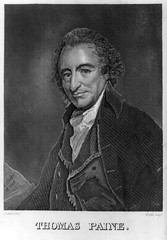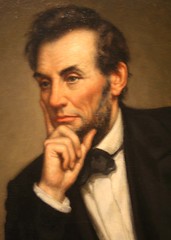Elizabeth Warren really hit a nerve among conservatives with her winning message about the the social contract and America's economy. What I didn't know is that she did it with an assist from the right's favorite philosopher on economic policy.
Just to review, here's what Warren said.
In a video of a recent Warren appearance, posted online by an individual who says he or she is not affiliated with the campaign, Warren answered the charge. “I hear all this, you know, ‘Well, this is class warfare, this is whatever,’” Warren said. “No. There is nobody in this country who got rich on his own — nobody.
“You built a factory out there? Good for you. But I want to be clear. You moved your goods to market on the roads the rest of us paid for. You hired workers the rest of us paid to educate. You were safe in your factory because of police-forces and fire-forces that the rest of us paid for. You didn’t have to worry that marauding bands would come and seize everything at your factory — and hire someone to protect against this — because of the work the rest of us did.
“Now look, you built a factory and it turned into something terrific, or a great idea. God bless — keep a big hunk of it. But part of the underlying social contract is, you take a hunk of that and pay forward for the next kid who comes along.”
Well, this drew responses the right by everyone from Paul Ryan to George Will and (of course) the Massachusetts Republican Party. The GOP demanded that Harvard dump Warren. Her opponent, Scott Brown, resorted to low blows about Warren's physique. Some right-wing bloggers reached for their revolvers.
Turns out, they'd have been better off reaching for their bookshelves instead of their gunracks. There they would find their dog-eared copies of Adam Smith's An Inquiry into the Nature and Causes of the Wealth of Nations in which, Truthout's Brian T. Thorn notes, the father of "the invisible hand" wrote the crib notes for Elizabeth Warren's stump speech.
Yes, that Adam Smith - beloved by laissez-faire capitalists for his economic metaphor, the invisible hand. From his 1776 work "An Inquiry Into the Nature and Causes of the Wealth of Nations":
"The woolen-coat, for example ... is the produce of the joint labor of a great multitude of workmen. The shepherd, the sorter of the wool, the wool-comber or carder, the dyer, the scribbler, the spinner, the weaver, the fuller, the dresser, with many others, must all join their different arts in order to complete even this homely production. How many merchants and carriers, besides, must have been employed in transporting the materials from some of those workmen to others who often live in a very distant part of the country! How much commerce and navigation in particular, how many ship-builders, sailors, sail-makers, rope-makers, must have been employed in order to bring together the different drugs made use of by the dyer, which often come from the remotest corners of the world!"(1)
There is a clear connection between the two passages. Both explain the cooperation required of businesses to build and sustain a functioning economy, cooperation with both government and workers. Both explain the importance of economic community.
Granted, I didn't know this either, but you'd think conservative media figures and political leaders would know their Adam Smith at least as well as Warren — a former Republican herself — does, before opening their mouths. Yet, Republicans seem to have lost the plot entirely.
George Will accused Warren of implying a "collectivist political agenda" in her statement, apparently forgetting — as E.J. Dionne noted — that in 1983 Will himself lamented the "thin gruel" that America's sense of community had become, and warned fellow conservatives that their "careless anti-government rhetoric" ran counter to what Americans really expect from government.
Paul Ryan accused Warren of "telling Americans that they’re stuck in their current station in life, that they’re a victim of circumstances beyond their control, and that the government’s role is to help them cope with it." When in fact Warren clearly explained that the economic crisis didn't "just happen," and that Americans aren't "victims of circumstances beyond their control," but of a financial sector that "broke the economy," and politicians who were content to let it happen as long as they got a cut.
Worse yet, Ryan accused Warren of falling victim to the "fatal conceit of liberalism," only to stumble over what sounds a lot like "the fatal conceit of conservatism."
"Few tricks of the unsophisticated intellect are more curious than the naïve psychology of the business man, who ascribes his achievements to his own unaided efforts, in bland unconsciousness of a social order without whose continuous support and vigilant protection he would be as a lamb bleating in the desert," wrote the great economic historian R.H. Tawney in 1926. He added pointedly that the arrogant assumption that marginal people's "distress is a proof of demerit... has always been popular with the prosperous."
Apparently that assumption is still popular in Republican debate audiences and among online commenters terrified of losing what little they have and desperately seeking targets that are easier to blame than the powerful interests that are actually taking them down.
For that matter, you'd think they would concur with the "common sense" of Thomas Paine — the patriot the right loves to co-opt.
Separate an individual from society, and give him an island or a continent to possess, and he cannot acquire personal property. He cannot be rich. So inseparably are the means connected with the end, in all cases, that where the former do not exist the latter cannot be obtained. All accumulation, therefore, of personal property, beyond what a man's own hands produce, is derived to him by living in society; and he owes on every principle of justice, of gratitude, and of civilization, a part of that accumulation back again to society from whence the whole came.
You might assume that a party that once upon a time called itself "The Party of Lincoln" would as honest as old Abe was about wealth and labor.
Labor is prior to, and independent of, capital. Capital is only the fruit of labor, and could never have existed if labor had not first existed. Labor is the superior of capital, and deserves much the higher consideration.
You'd be wrong.
Instead of having coniptions over what Elizabeth Warren said, maybe conservatives should be asking themselves: What would Thomas Paine say? What would Abe Lincoln say? And what would Adam Smith say?
Probably nothing that didn't already say.




